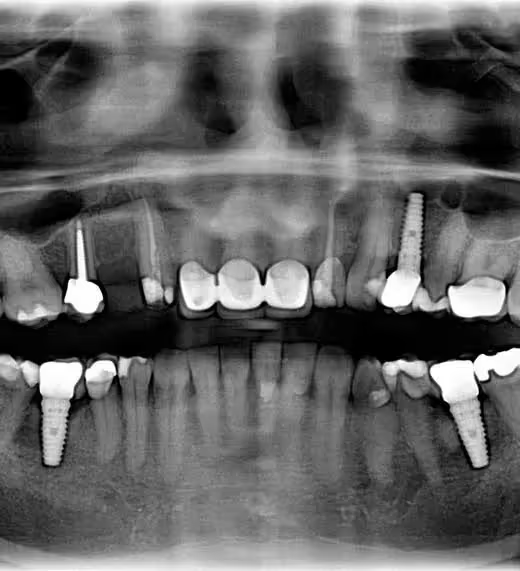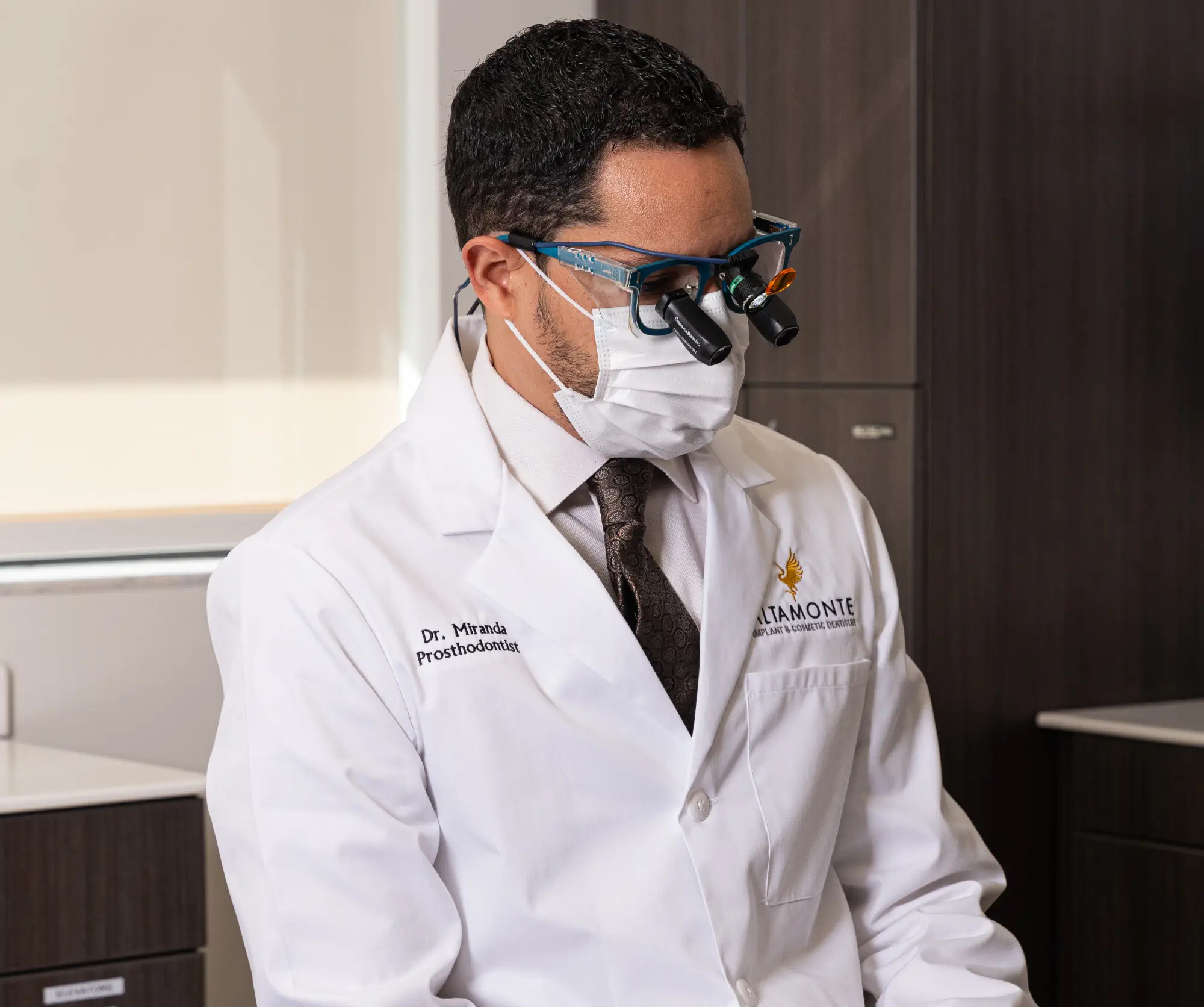Losing your teeth can be devastating. In addition to changing the way you look, losing teeth can make it harder to eat or speak. But, thanks to modern technology, dental implants can be used to effectively replace one or more missing teeth. Dental implants can give you the improved self-confidence that comes with being comfortable with a natural, beautiful, healthy smile, and teeth that function exactly like natural teeth. Our dental implants can be used to stabilize dentures, and create a better-functioning bite. One of the most enjoyable life benefits is that dental implants allow you to eat any food you want, without worrying about damaging dentures.

WHAT EXACTLY
ARE DENTAL IMPLANTS?

Dental implants are a restorative treatment that replace your missing teeth with new teeth that feel, look and perform like healthy, natural teeth. Dental implants are surgically inserted below the gums, fusing to the jawbone, and serve as a base for replacement teeth, or for inserting crowns or bridges. Your dental implant is fused to your natural bone, creating permanence and stability. By integrating your actual bone, dental implants not only feel natural, but visually, look exactly like real teeth.
WHY YOU MAY
NEED DENTAL IMPLANTS
To replace any missing teeth without treating, and potentially damaging, the teeth on either side of the empty space in your smile as with bridgework.
To support bridges or dentures when needed, making these dental structures more comfortable and secure.
To address any problems with your bite that have been caused by teeth shifting to fill in spaces caused by missing teeth.
COMMON TYPES OF DENTAL IMPLANTS
Dr. Miranda is a certified prosthodontist, a specialist in the field of dental implants and prostheses. He is well-versed in a range of types of dental implants. Which implant is best for your unique situation will depend on the extent of your tooth loss. 3-D imaging will be used to assess which of these implants would best meet your needs:

SINGLE TOOTH DENTAL IMPLANT:
A dental implant that replaces a single missing tooth. These implants replace single teeth by using a dental crown or bridge placed on top of an implant post. This type of implant is usually recommended for patients who lost teeth through injury or extraction.
ALL-ON-4 DENTAL IMPLANTS:
These are dental implants that replace all missing teeth in one jaw permanently. All-on-4 dental implants are a great alternative to full dentures because they offer the fastest and most cost efficient procedure to achieve permanent fixed teeth. All-on-4 dental implants use four posts in both the upper and lower jaw to hold arches of artificial teeth firmly and comfortable in place.
MINI DENTAL IMPLANTS:
Mini dental implants are used to provide stability to patients with dentures or partial dentures. Mini implants that are used to secure dentures are single piece implants, meaning they do not have a screw hole into which other components can be attached. A small, ball-shaped portion of the implant sticks out of the gums and snaps securely into a retaining socket contained on the inside of a denture. This creates a very stable denture which does not suffer from the common problems such as movement, popping out, and application of messy adhesives. The dentures still remain on the gum tissue but the housing in which the implant connects keeps them from slipping or clicking.
THE DENTAL IMPLANT
PROCEDURE
EVALUATING YOUR NEED FOR DENTAL IMPLANTS:
Before any procedure is performed, Dr. Miranda will give you a thorough dental exam that includes taking X-rays of your teeth and jawbone. Your X-rays will help Dr. Miranda locate the ideal placement locations for your dental implants.

FINAL STEPS
After your dental implants have fully integrated with your jawbone, new teeth are attached to the permanent dental implant. Any bridge or dentures attached to the implant will be custom-made to fit your unique mouth, and perfectly match your teeth in color, shape and size. Dental implants instantly restore the function, look, and strength of your teeth without the worry slipping as is common with traditional dentures.

DENTAL IMPLANT PLACEMENT:
The dental implant procedure begins with numbing the area where the implants will be inserted. A small incision is made and the implant posts are placed directly into your jaw. The number of implants used will depend on the number of teeth you are missing. Implants posts are left to heal for four to six months, with a temporary restoration provided for you to wear during this time. During the healing, your dental implants completely fuse with surrounding bone, allowing them to work like functional tooth roots.

THE BENEFITS OF
DENTAL IMPLANTS
Dental implants are strong, stable, and last for years
Dental implants use the most up-to-date technology and high-quality dental materials
Dental implants feel and look like natural teeth
Dental implants can support any existing dentures you already have to help you feel more comfortable chewing and speaking
Dental implants don’t slip out of place when talking or eating

THE PROBLEMS OF MISSING TEETH
Besides being not aesthetically pleasing, missing teeth can also be bad for your oral health. Any gaps in your teeth may cause bacteria build-up that increases risk of dental disease. The jaw structure under missing teeth can begin to shrink, impacting your facial structure. Tooth gaps can also negatively impact your bite. The teeth around the empty space often shift around to compensate, misaligning your natural bite. When teeth no longer fit together correctly, it can create discomfort and other dental problems. Missing teeth can also severely hamper your self-esteem, leaving you feeling self-conscious about your smile.
DENTAL IMPLANTS ARE COMPLETELY SAFE FOR YOUR HEALTHY TEETH
Modern dental technology has made it so that today’s dental implants have zero effect at all on the health of your adjacent natural teeth. Other tooth-replacement treatments can’t make this claim. For example, bridgework uses natural teeth on both sides of gap caused by a missing tooth to provide support for dental bridges. This leads to stress on those adjacent teeth, potentially weakening them over time by making them loose, or more susceptible to decay.


DENTAL IMPLANTS ARE AS EASY TO MAINTAIN AS NATURAL TEETH
Dental implants require the same care your natural teeth do. Twice daily brushing, regular flossing, and routine dental exams is all your implants will require. You’ll never have to use creams, adhesives, or soak teeth overnight to clean them, like with traditional dentures. Good oral hygiene will ensure your dental implants last a lifetime.
FREQUENTLY ASKED
QUESTIONS
WHY DO MOST PEOPLE PREFER DENTAL IMPLANTS?
Dental implants are a long-term investment and should be for life. Having a dental implant is an optimum long-term solution which is why they are preferred over other methods that require more maintenance or potential repair.
HOW MUCH DO DENTAL IMPLANTS COST?
The cost of dental implants varies depending on the number of restorations and the patient's dental condition. To get an accurate estimate for the cost of your restoration, meet with your dentist for a consultation and discuss all your options.
DO ALL DENTISTS DO IMPLANTS?
Not all dentists do implants as some dentists will refer you to a specialist such as an oral surgeon to have the post for the implant placed, and then they will attach the permanent crown or bridge once the area has healed.
WHY DO I NEED A DENTAL IMPLANT AFTER AN EXTRACTION?
A dental implant is important after an extraction because it will prevent your teeth from shifting. If there is an empty space in your gums left by an extracted tooth, then the rest of the teeth around that space may start to slowly move or drift which will require more work in the future to correct.
WHAT ARE DENTAL IMPLANTS MADE OF?
Dental implants are composed of various materials, from the artificial root to the crown or bridge. The artificial root or implant that is placed in the bone to act as an anchor for the eventual crown is typically made of zirconia or titanium or, less frequently, other non-metal materials.
The crown is typically a ceramic tooth that mimics the appearance of a real tooth so that it is indistinguishable from your natural teeth.
HOW LONG DO DENTAL IMPLANTS LAST?
Dental implants are meant to last a long time. The typical lifespan of a dental implant could be up to twenty-five years.
Implants usually do not need to be replaced unless physical or medical situations compromise the crown, your gums or jawbone, or the implant itself. Good oral hygiene practices will substantially increase the longevity of a dental implant.
DO DENTAL IMPLANTS HURT?
Dental implants only hurt or feel uncomfortable during the surgery, which involves placing the artificial root. The surgery will either be performed under local or general anesthesia depending on the extent of the procedure.
They may feel swollen or painful during the first week and at most, 10 days after the procedure. During the first week, any pain or discomfort can be managed with pain relief medication that may be suggested or prescribed by your oral surgeon.
SCHEDULE YOUR
CONSULTATION TODAY
Patients who suffer with one or missing teeth need a strong, long-lasting option other than dentures. Dental implants might be the right choice for you. Contact the dental office of Dr. Miranda today to discuss how dental implants might benefit you. He and his qualified, dedicated staff are ready to help you get the easy, confident smile you want.
.webp)



